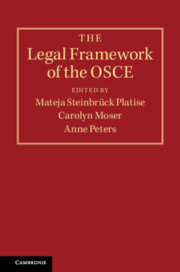Book contents
- The Legal Framework of the OSCE
- The Legal Framework of the OSCE
- Copyright page
- Contents
- Contributors
- Preface
- Abbreviations
- Part I Introduction
- Part II The Quest for International Legal Personality
- Part III Manifestations of the Legal Position under International Law
- Part IV The Legal and Institutional Framework as a Governance Issue
- 12 The OSCE as a Case of Informal International Lawmaking?
- 13 Conceptualising Accountability in the Legal and Institutional Framework of the OSCE
- 14 Legitimate Governance as a Privilege and Price for the Autonomy of International Organisations
- Part V Conclusions
- Index
- References
12 - The OSCE as a Case of Informal International Lawmaking?
from Part IV - The Legal and Institutional Framework as a Governance Issue
Published online by Cambridge University Press: 15 August 2019
- The Legal Framework of the OSCE
- The Legal Framework of the OSCE
- Copyright page
- Contents
- Contributors
- Preface
- Abbreviations
- Part I Introduction
- Part II The Quest for International Legal Personality
- Part III Manifestations of the Legal Position under International Law
- Part IV The Legal and Institutional Framework as a Governance Issue
- 12 The OSCE as a Case of Informal International Lawmaking?
- 13 Conceptualising Accountability in the Legal and Institutional Framework of the OSCE
- 14 Legitimate Governance as a Privilege and Price for the Autonomy of International Organisations
- Part V Conclusions
- Index
- References
- Type
- Chapter
- Information
- The Legal Framework of the OSCE , pp. 241 - 272Publisher: Cambridge University PressPrint publication year: 2019
References
- 1
- Cited by



